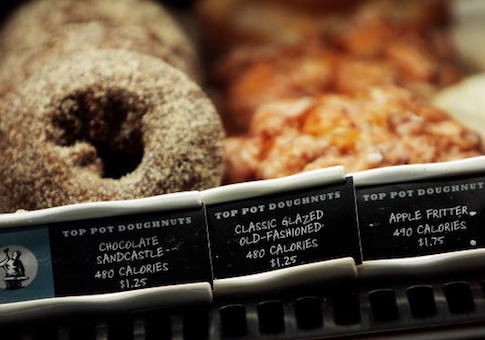The House of Representatives passed bipartisan legislation Tuesday giving greater flexibility to restaurants and grocery stores in complying with an Obamacare regulation that mandated every food item be labeled with calorie counts.
The Common Sense Nutrition Disclosure Act, sponsored by House Republican Conference Chair Cathy McMorris Rodgers (R., Wash.), passed on a 266 to 157 vote, with 32 Democrats joining Republicans.
"This bill isn't about the merits of calorie counts; it's about providing flexibility for businesses to provide that information in a way that makes sense for them and their customers," McMorris Rodgers said. "The one-size-fits-all approach proposed by the FDA is problematic, and by bringing this rule into the 21st Century, customers can trust they are getting the reliable information they need in an easy-to-access, consumer-friendly way."
The Food and Drug Administration issued draft guidance in an attempt to make it easier for chain restaurants and groceries to comply last November. The Trump administration guidance, which followed several rounds of guidance from the Obama administration, still left confusion over how to comply.
For instance, the guidance only contained "nonbinding recommendations." The FDA was also unclear in the guidance about whether draft beers must be labeled on menus. The government said, "It depends."
The bill would alleviate these concerns by allowing businesses to post calories online, and would address issues with the Obama administration's 171-word definition of a "menu," which would have applied to coupons and advertisements."
McMorris Rodgers called the calorie rule, which originated in the Affordable Care Act, one of the "most burdensome rules in the Obama administration."
"Under the current rule, every deli, salad bar offering, every possible pizza combination, will have to be calculated, and their calorie count displayed on physical menus," she said prior to the vote. "Last week I was home in Spokane, visited my fresh basket, this newly opened grocery store is also a great place to eat lunch, with fresh local options and made-to-order food. This rule would mean new physical signage every time this locally owned grocer changes the options they offer, which is just about every day."
McMorris Rodgers said the legislation would give breathing room for sandwich shops and pizzerias, which offer millions of combinations.
"It's unrealistic, and it's not a good use of the business owners' time," she said of the rule. "Digital and online ordering is customers preferred method for ordering. Nearly 90 percent of orders in some restaurants are placed without an individual ever stepping foot into the restaurant."
"So tell me, how does it make sense for a restaurant to have a physical menu with calorie listings when 90 percent of your customers aren't going to see it," McMorris Rodgers said. "Or how does it make sense to force a customer to navigate millions of combinations to find the nutrition information that matches their order?"
McMorris Rodgers praised her colleagues and the bipartisan team who worked on the legislation "over a number of years."
The final regulation was released in November 2014, and immediately caused complaints among of pizza chains who said the rule was "impossible to comply" with. The Obama administration's final rule carried criminal penalties, and possible jail time for violations of "misbranding" food with incorrect calorie counts.
The rule was initially set to go into effect in December 2015, but was delayed several times, most recently by the Trump administration last year. The rule is set to go into effect in May 2018.
